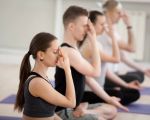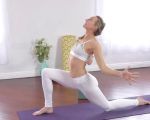Yoga for Beginners: Tips to Get Started for a Healthy Practice
vbnet复制1. Understanding Yoga: A Journey to Health and Wellness
Yoga is more than just a physical workout; it's a holistic practice that nurtures the mind, body, and soul. For beginners, it can seem overwhelming, but the first step to getting started is understanding what yoga is all about. At its core, yoga is a combination of breath control, meditation, and movement. It promotes flexibility, strength, and balance while also reducing stress and improving mental clarity. Many people, myself included, find that yoga not only improves their physical health but also brings a sense of peace and mindfulness into their daily lives.
2. Choosing the Right Style of Yoga for You
There are many styles of yoga, and each offers a unique approach to the practice. As a beginner, it can be difficult to know where to start. Some popular styles include Hatha, Vinyasa, and Restorative yoga. Hatha yoga is a gentle introduction to yoga, perfect for those new to the practice. Vinyasa is a more active form, with sequences that flow from one posture to the next. Restorative yoga is ideal for those seeking relaxation and stress relief. It's important to try different styles to find the one that resonates with you and fits your needs.
3. Invest in Comfortable Yoga Gear
While yoga doesn't require much equipment, having the right gear can make your practice more comfortable. A good-quality yoga mat is essential, providing cushioning and grip for your movements. I recommend choosing a mat that suits your style of yoga, whether it’s a thick mat for added comfort or a thinner one for better stability. Additionally, wearing comfortable, stretchy clothing is important so that you can move freely through each pose. Don't worry about purchasing expensive gear; simplicity and comfort should be your priority.
4. Mastering Basic Poses: Start Slow
As a beginner, it’s crucial to start with the basics. Learning the foundational poses, such as Downward Dog, Child's Pose, and Warrior poses, is essential for building a solid foundation. I remember feeling a little unsure when I first tried some of these poses, but with consistent practice, they became second nature. Don't rush your practice. Focus on your breathing and proper alignment to prevent injury and ensure you're getting the most out of each pose. It's also a good idea to attend a class or follow online tutorials to get guidance on technique.
5. Focus on Your Breathing
Breathing is a cornerstone of yoga practice. The breath helps guide the body through each movement and promotes relaxation. Inhaling deeply through the nose and exhaling through the mouth allows you to stay present and mindful during your practice. I found that when I focused on my breath, I was able to move more fluidly and maintain calm throughout the session. Learning proper breath control can also improve your energy levels and help reduce anxiety.
6. Practice Regularly and Be Patient
Yoga is not a practice that yields immediate results, but with time and consistency, you’ll notice significant improvements. Set realistic goals for yourself, and commit to practicing at least a few times a week. As with any new skill, progress will take time, and it’s important to be patient with yourself. Yoga is not about perfection but about progress. Celebrate the small wins, whether it’s holding a pose longer or simply feeling more relaxed after each session. I’ve personally experienced the benefits of yoga over time, and the more consistent I’ve been, the more rewarding my practice has become.
7. Yoga for Mental Health: A Balanced Lifestyle
Yoga isn't just about physical benefits; it's a powerful tool for mental health as well. The combination of mindful movement and breathing techniques helps reduce stress, anxiety, and depression. I’ve personally found yoga to be a great way to clear my mind after a long day or to start my morning with a sense of calm. Regular practice encourages mental clarity, emotional balance, and a deeper connection to yourself. Whether you practice at home or in a group setting, yoga provides a space to connect with your body and mind, allowing you to live a more balanced, peaceful life.








